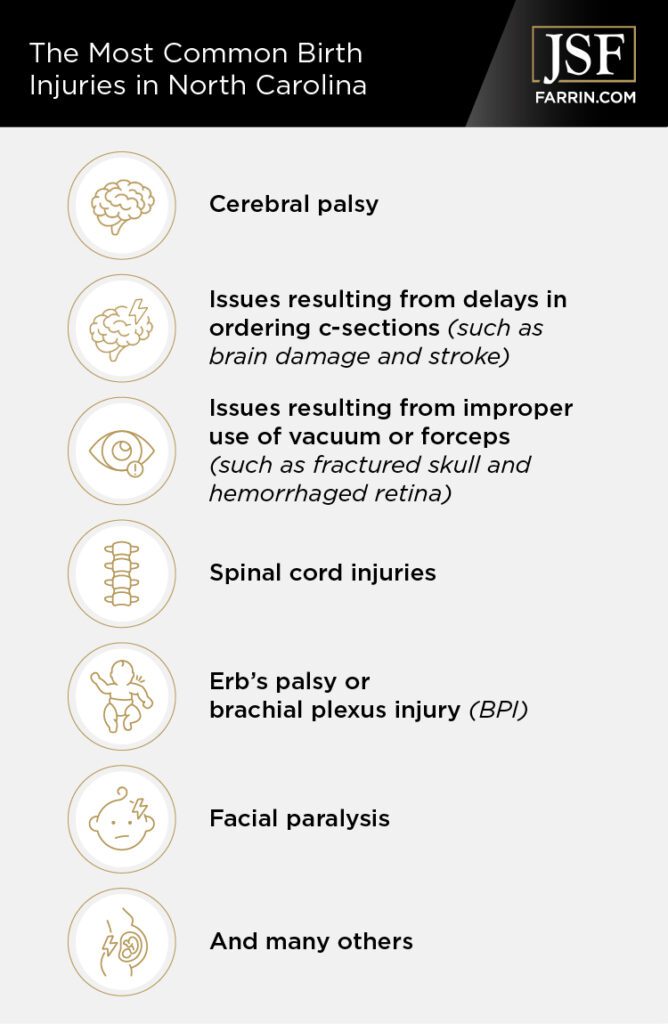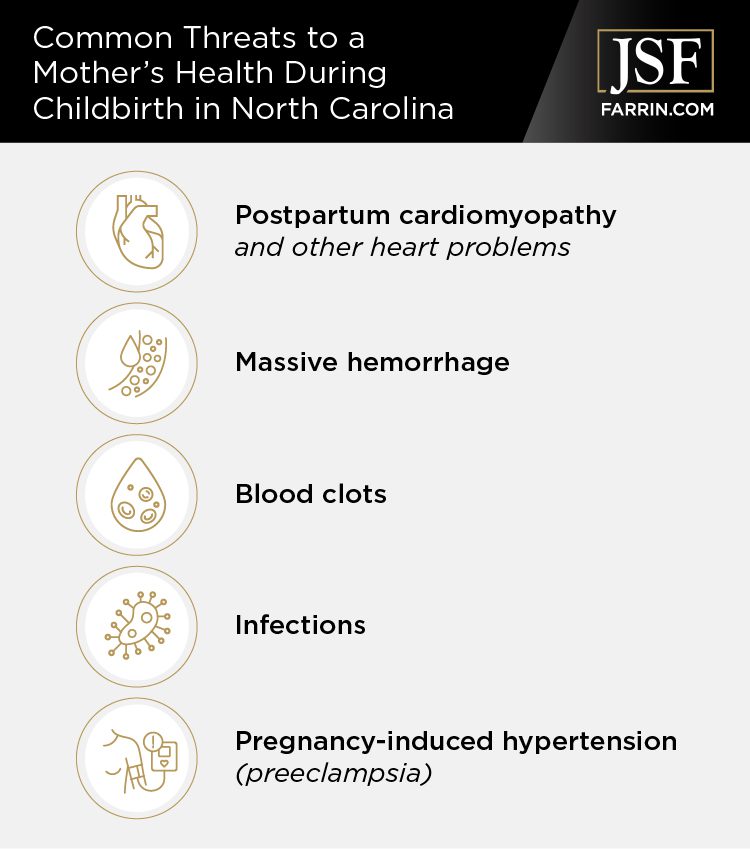Were you or your newborn injured by another’s negligence during birth?
Your family may be owed significant compensation. But, despite the tragedy, the at fault party’s insurer is protecting their own interests, not yours. An attorney is on your side and can significantly increase your odds of receiving maximum compensation.

This page refers to Birth Injury Claims in North Carolina.
Since laws differ between states, if you are located in South Carolina, please click here.
Birth Injuries in North Carolina: Protect Your Rights
Hospitals and medical professionals in North Carolina have a duty to provide reasonable care in labor and delivery. The vast majority of the time, doctors, nurses, and medical professionals act with extreme care for both mother and child.
However, mistakes are made, and the consequences to the mother and baby can be devastating, life-long, or even life-ending. Furthermore, some of these mistakes may be covered up when the victims simply do not have the information to recognize they were wronged.
If you are facing the extremely unfortunate event of a birth injury to you or your child, we know how to help you.
Contact us online or call 1-866-900-7078 for your free case evaluation. A real person is available to speak with you right now.
How Do You Know Who Is at Fault in a Birth Injury?
There are instances when those responsible for care during pregnancy and childbirth may lead families to believe there was a genetic issue or something went awry in utero when actually the child or mother was hurt during delivery. But how do you know the truth?
Was the mother given too much medication during labor? Was a C-section ordered in time? Did the baby lack oxygen, which can result in brain damage or cerebral palsy? Did the doctor pull or push on the baby’s neck too hard, damaging nerves or the brain, which can lead to Erb’s palsy or shoulder dystocia?
Some families may never know the truth. The medical establishment may not always be forthcoming about their mistakes. We know how to pursue the answers families need and the full compensation they may deserve.
Failures by Medical Professionals That Can Cause Injuries
Some of the most common mistakes medical professionals make during a childbirth procedure include:
- Failure to record or properly address fetal changes
- Failure to closely monitor diabetes, heart disease, hypertension, asthma, kidney disease, thyroid disease, and other conditions
- Failure to deliver the baby in a timely manner
- Failure to diagnose birth defects that could have been treated in utero
- Failure to perform proper pre-natal testing
- Failure to properly monitor the baby during labor and delivery
- Failure to recognize an ectopic pregnancy
- Inadequately monitoring the mother during pregnancy and labor
- Misinterpreting test results during pregnancy or failing to conduct necessary tests
- Neglecting to perform required tests
- Neglecting to refer high-risk patients to specialists
- Prescribing experimental drugs without properly informing patient of the associated risks
Compensation You May Deserve for a Birth Injury in North Carolina
Birth injuries can have a wide range of life-altering consequences on your baby and your family. An experienced birth injury attorney can help you understand the potential long-term expenses that you may encounter.
You may be owed significant compensation for:
- Medical expenses
- Pain and suffering
- Mental anguish
- Loss of care and family duties
- Punitive damages
- Wrongful death
- Funeral expenses for the mother or baby
Here are answers to other questions that people in your situation commonly have:
Are Injuries to Mothers Common During Childbirth in North Carolina?
One recent news report indicated that pregnancy in North Carolina is more dangerous for mothers than in the U.S. overall and that the number of women who nearly died from pregnancy in North Carolina is close to the highest level it has been in years.
An average of about 26.5 women die during childbirth per 100,000 births in North Carolina, higher than the national average of about 23.5 deaths, according to the National Center for Health Statistics.
If you, or someone you love, were injured after giving birth and while still in the care of a hospital, a personal injury attorney can guide you through what comes next. To see what you may be owed, contact us online or call 1-866-900-7078. A real person is ready to speak with you right now.
What Are Common Preventable or Treatable Threats to a Mother’s Health in North Carolina?
The medical staff at any North Carolina hospital or birthing center should be familiar with, and be able to address, well-known complications that threaten the health of the mother both during and after childbirth.
Threats to the mother’s health include:
- Postpartum Cardiomyopathy and other heart problems – Postpartum cardiomyopathy is heart failure that happens during the end of pregnancy or for up to five months after birth. The heart chambers enlarge and muscle weakens, reducing blood flow and the supply of oxygen to organs.
- Massive hemorrhage – Postpartum hemorrhaging can have many causes and is considered an obstetric emergency. It is one of the top five causes of maternal mortality worldwide.
- Blood clots – After giving birth, some bleeding and passing of clots are expected as the mother’s body transitions. However, blood clots in the mother’s veins are a serious threat. During pregnancy, a mother’s body produces more clotting factors to protect itself during childbirth, so the risk is higher in the weeks following delivery, and mothers should be in regular contact with their doctors.
- Infections – A puerperal infection occurs when bacteria infect a woman’s uterus and surrounding tissues after she gives birth. Infections are responsible for about 10% of postpartum deaths in the U.S.Common types of infection include:
-
-
- endometritis: an infection of the uterine lining
- myometritis: an infection of the uterine muscle
- parametritis: an infection of the areas around the uterus
-
- Pregnancy-induced hypertension (preeclampsia) – This is a form of high blood pressure that develops during pregnancy and must be treated carefully. It can persist after birth. The condition is characterized by damage to other organ systems, usually the liver or kidneys.
Doctors and hospitals should know what to watch for to help keep new mothers safe from common postpartum issues. If you, or someone you know, were injured or suffered postpartum complications due to the negligence of those charged with your care, contact a personal injury attorney today to discuss the facts of your case and what your family may be owed.
What Are Common Birth Injuries in North Carolina?
Whether misdiagnosis, medication error, or inattention to signs of fetal distress, errors during delivery can have lifelong financial, physical, and emotional consequences.
Common diagnoses from injuries to the baby during birth in North Carolina include:
Cerebral Palsy
Cerebral palsy is a disorder that affects control of muscle coordination and bodily movement. Most children with cerebral palsy have it at birth, yet symptoms may not be diagnosed for a few years.
Here are some indicators to look for – in utero or during delivery – that can potentially result in trauma and a cerebral palsy diagnosis:
- Baby’s heart rate is too fast or too slow
- Umbilical cord causes lack of oxygen to the baby
- Baby is too large for a vaginal birth or too small to be born safely
- Infections the mother had during pregnancy
- C-section is not ordered in time
Issues Resulting from Delays in Ordering a C-section
If a child suffers from distress during the birthing process, doctors will often order an emergency C-section. It might be ordered if the baby’s heart rate slows because of the mother’s drop in blood pressure due to blood loss, slowed labor, uterine rupture, or many other delivery issues.
Timing is crucial. Delayed C-sections can result in a host of problems, the most dangerous of which is lack of oxygen to the baby’s brain (hypoxia).
If the C-section is ordered too late, consequences often include:
- Brain damage resulting in mental deficiencies
- Cerebral palsy
- Erb’s palsy
- Lung or heart problems
- Stroke
- Death
Issues Resulting From Improper Use of Vacuum or Forceps
When a baby has difficulty exiting the birth canal, the doctor may use vacuums, forceps, or other tools as an aid. When used improperly, these tools could harm the child, and their use could be medical malpractice.
Vacuum Use
Improper use of these tools can cause health complications including:
- Fractured skull
- Hemorrhaged retina
- Brachial plexus (shoulder dystocia and Erb’s palsy)
- Brain hemorrhage
- Cerebral palsy
If not treated, some of these conditions can lead to paralysis, intellectual disability, and in the case of a hemorrhage, death.
Forceps Use
If these tools are not employed properly, a baby could suffer neck, spine, or brain damage, potentially resulting in:
- Facial nerve damage
- Spinal cord damage leading to partial or complete paralysis
- Brain damage leading to loss of motor function, including cerebral palsy
Improper forceps use can also harm the mother, causing complications or injuries including:
- Rupture of the uterus
- Urethra, bladder, and genital tract damage
- Weakening of the pelvic area
- Blood loss resulting in anemia
Spinal Cord Injuries
Whether a bruise, complete severance, or misdiagnosis of a spinal cord deformation in utero, spinal cord injuries can lead to life-long problems. Some are treatable, some are not.
Some of the factors that may lead to spinal cord injury include difficult delivery, breech birth and other abnormal birth positions, the torque and stresses on the baby’s spine during birth or from the doctor pulling and pushing, and hyperextension of the baby’s head, among other things.
Conditions that can result from spinal cord injuries include:
- Erb’s Palsy or Brachial Plexus Injury (BPI), a form of nerve damage
- Paralysis of the face, either fully or partially
Other birth Injuries and complications include:
- Anesthesia-related complications
- Aspiration of Meconium
- Brain damage or head trauma
- Cystic fibrosis
- Injuries resulting from Hypoxic Ischemic Encephalopathy (HIE)
- Tay-Sachs disease
- Thalassemia
- Torticollis (wry neck)
If your baby suffered an injury during birth or in utero, contact us online immediately or call 1-866-900-7078. Our experienced team of professionals will evaluate the unique circumstances of your birth injury case for free and help you understand what you may be owed.
Your North Carolina Birth Injury Attorney: Why Choose James Scott Farrin
At the Law Offices of James Scott Farrin, our attorneys are passionate about helping injured families seek all the compensation they may deserve after being harmed by negligence during the birth of their child. We’ve created our You-First Policy to give you peace of mind that we prioritize what matters to you throughout your case – your needs, your concerns, and your rights.
We fight to get you as much compensation as possible, as fast as possible. Since we opened our doors in 1997, we’ve helped 73,000+ people recover more than $2 billion in total compensation.1 And we can help you, too.
There’s no need to worry about the cost of a high quality attorney to be your advocate. As part of our You-First Policy, you pay no upfront costs, no hourly fees, and no attorney’s fee at all unless we recover compensation for you. Guaranteed.2
Contact us online for answers, help, and a free evaluation of your case. A real person is ready to assist you right now – just call 1-866-900-7078.




